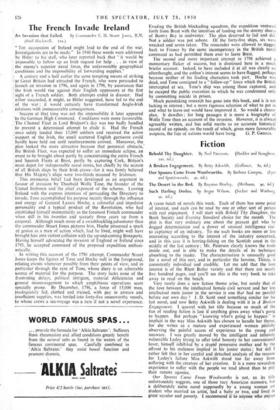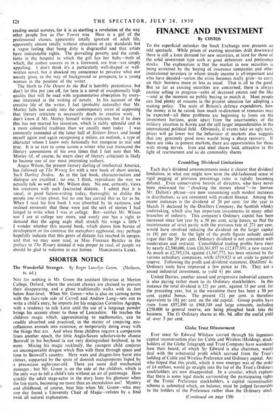Fiction
A Broken Engagement. By Betty Askwith. (Gollancz. 8s. 6d.) The Desert in the Bed. By Royston Morley. (Methuen. 9s. 6c1.) Such Darling Dodos. By Angus Wilson. (Secker and. Warburg. 9s. 6d.) A GOOD batch of novels this week. Each of them has some point of interest, and each can be read by one or other sort of person with real enjoyment. I will start with Behold Thy Daughter, the Book Society and Evening Standard choice for the month The plot is that very ordinary one about the peasant girl who by dogged determination and a dower of unusual intelligence rise' to captaincy of an industry. To me such books are more or less interesting 'according to the interest of the industry concerned, and in this case it is herring-fishing on the Scottish coast in the middle of the last century ; Mr. Paterson clearly knows the trade inside out, and is able to make the details of its technique absorbing to the reader. The characterisation is unusually good for a novel of this sort, and in particular the heroine, Thirza, is consistently individual and.credible. Let me add that the love interest is of the Rhett Butler variety and that there are nearly five hundred pages, and 'you'll see this is the very book to take away to read 'on the- beach.
Very rarely does a new fiction theme arise, but surely that of the love between the intellectual female civil servant and her less intellectual male junior in the service is one that had no parallel before our own day ? J. D. Scott used something similar for his last novel, and now Betty Askwith is dealing with it in A Broken Engagement. I quarrel with her title because so much of the fun of reading fiction is lost if anything gives away what's going to happen. But perhaps " knowing what's going to happen " is implicit in the way Miss Askwith has chosen to handle her theme, for she writes as a mature and experienced woman pitifully observing the painful access of experience to the young and unaware. I was greatly moved by the intelligent and infinitely vulnerable Lesley trying to offer total honesty to her conventional lover, himself inhibited by a stupid possessive mother and by the affront to his maleness implied in his junior status ; but still I rather felt that in her careful and detached analysis of the reasons for Lesley's failure Miss Askwith stood too far away from suffering with the creature of her creation. It is a more rewarding experience to suffer with the people we read about than ,to pity their remote agonies.
Our Spoons Came From Woolworths is not, as its title unfortunately suggests, one of those racy American memoirs, but a deliberately naive novel supposedly by a Young woman art student who married an artist, had a baby pr two, and lived in great squalor and poverty. -I recommend it to anyone who enjoys
reading social surveys, for it is as startling a revelation of the way other people live as Our Towns was. Here is a girl of the professional classes, apparently totally ignorant of adult life, apparently almost totally without education or any standards but a vague feeling that being dirty is disgraceful and that artists have indisputable rights. The prevailing poverty and the condi- tions in the hospital in which the girl has her baby—both of which„ the author assures us in a foreword, are true—are simply appalling. I don't think it's a particularly well-shaped or well- written novel, but it shocked my conscience to perceive what our society gives, in the way of background or prospects, to a young woman in the position of the writer.
The blurb to The Desert In the Bed is horribly pretentious, but don't let this put you off, for here is a novel of exceptionally high quality that will be read with argumentative absierption by every- one interested in the writing of novels. In his account of the creative life of the writer, I feel (probably naturally) that Mr. Morley falls too easily into the contemporary error of supposing that literary criticism is necessarily death to creative work. I don't know if Mr. Morley himself writes criticism, but if he does this has not marred his invention, which is richly splendid and in a more colourful tradition than we usually meet today I was constantly reminded of the latter half of Sinister Street, and found myself again and again recognising a milieu, an- outlook, a type of character whom I know only fictionally but recognise as real and true. It is so rare to come across a writer who can transcend the literary conventions of his own times that I feel sure that Mr. Morley (if, of course, he steers clear of literary criticism) is likely to become one of our most interesting authors.
Angus Wilson, the present literary darling of intellectual America, has followed up The Wrong Set with a new book of short stories, Such Darling Dodos. As in the last book, characterisation and dialogue are excellent ; no one, I think, reproduces the way we actually talk so well as Mr. Wilson does. No one, certainly, views his creatures with such fascinated distaste. I admit that it is usual, in good fiction-writing today, thoroughly to dislike the people one writes about, but no one has carried this as far as he. When I read his first book I was absorbed by its nastiness, and realised enviously that these were just the sort of stories I had longed to write when I was at college. But—neither Mr. Wilson nor I are at college any more, and surely one has a right to demand that the aging eagle shall stretch his wings a little ? I wonder whether this second book, which shows him barren of development or (to continue the metaphor) eggbound, may perhaps hopefully indicate that this genre of distaste has reached its apogee, and that we may soon read, as Miss Florence Barclay in the preface to The Rosary insisted it was properjo read, of people we should be glad to welcome in our homes. MARGHANITA LASKI.



































 Previous page
Previous page